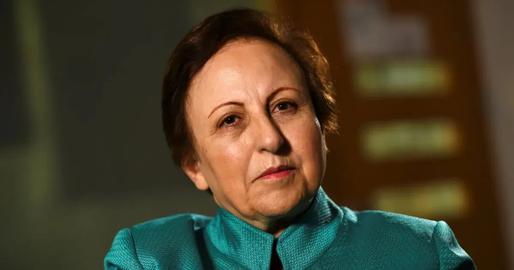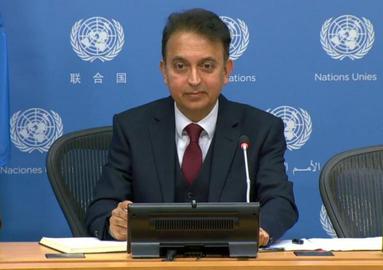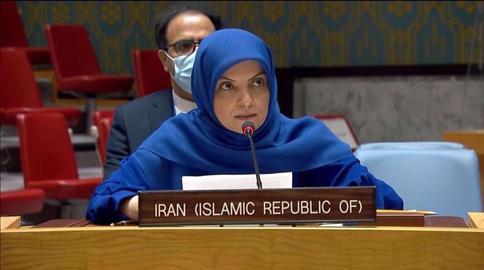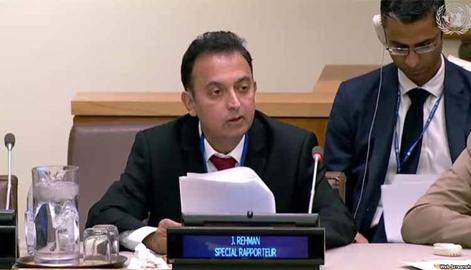The UN’s human rights office has announced that Alena Douhan, the Special Rapporteur on unilateral coercive measures, will visit Tehran from May 7 to 18 to study the impact of sanctions on human rights in Iran.
According to the statement, Douhan will meet with various representatives of the Iranian state during her visit, as well as businesses and NGOs. The purpose of the visit is to assess how far sanctions have impeded Iranian people’s full realization of their rights, particularly “development”.
Unlike her colleague Javaid Rehman, the Special Rapporteur on human rights in Iran, Douhan has faced no resistance from the Islamic Republic to the planned visit. On the contrary: she was invited by the Iranian government. Officials have enthusiastically endorsed the trip, while some long-time Iranian human rights advocates are alarmed.
Who is the Special Rapporteur Bound for Tehran?
Alena Douhan is a citizen of Belarus. She was appointed £UN special rapporteur on the negative impact of unilateral coercive measures on the enjoyment of human rights”, a position created in 2014, in March 2020 and has since submitted reports on US sanctions on Venezuela and Saudi Arabia’s sanctions against Qatar.
After visiting Venezuela in 2021, Douhan wrote: “The devastating effect of sanctions imposed is multiplied by extra-territoriality and over-compliance, adversely affecting public and private sectors, Venezuelan citizens, non-governmental organizations, third country national and companies. Humanitarian exemptions are lengthy, costly, ineffective and inefficient.”
The sanctions there, she said, had let to chronic shortages of machinery and spare parts, water, electricity, fuel, gas, food and medicine, as well as a “brain drain” whereby skilled workers including doctors and engineers had left the country in droves. The cumulative impact, she wrote, was “enormous”.
Why are Activists Worried?
It appears that the groundwork for Douhan’s visit to Iran was laid by a private law firm close to the Iranian regime. After an online conference organized by this company about the effects of US sanctions on Iran, officials were persuaded to formally invite her.
Douhan’s mission does not take in the broader state of human rights in Iran or the well-documented, gross violations of human rights by the Islamic Republic. Instead it is likely to focus on the impact of US and EU sanctions. The trip is thus being regarded by Tehran as a propaganda opportunity.
In a letter penned on April 2022 to the UN High Commissioner for Human Rights, the Iranian lawyer and Nobel Peace Prize laureate Shirin Ebadi called for the visit to be postponed until Tehran let in the UN Special Rapporteur on human rights in Iran. The regime holds that Javaid Rehman’s position is “political” and has not allowed him access to the country since his appointment in summer 2018.
Ebadi told the BBC: “As a defender of human rights, I’m think about people’s interests. Faced with trickery and deception by the government, I must cry out that bringing in the sanctions rapporteur is in fact a ploy by the Iranian state.”
Why Can’t the Main Human Rights Rapporteur Go to Iran?
In line with his mandate, Javaid Rehman has called for an independent inquiry into the state’s 1988 massacre of thousands of political prisoners in Iran, and the role of Ebrahim Raisi, the current president of the Islamic Republic, in those extrajudicial executions. The Islamic Republic describes Rehman’s mission as a “political” one and has never permitted him or his colleagues to enter the country.
The mission of the UN Special Rapporteur on Human Rights in Iran is to monitor and document the wider state of human rights in the country. It is therefore natural the Islamic Republic would lock out Rehman; the briefest of visits to an Iranian prison or detention center, or even a walk in streets overseen by violent “morality patrols” forcing women to wear unwanted hijab, would be enough for a negative report to be filed – let alone the state’s backing of torture, forced disappearance and persecution of religious minorities.
In every report he has so far produced, Javaid Rehman has described the situation in Iran as “more serious” than before. This has not endeared him to the Islamic Republic, which calls his work “biased” and “political”.
After the UN Human Rights Council renewed Rehman’s mandate on April 1, Iranian officials made their displeasure very clear. In a statement, the Iranian judiciary’s so-called High Council of Human Rights declared the vote “cannot be basis for cooperation and interaction and the Islamic Republic of Iran utterly rejects it.”
Foreign Ministry Spokesman Saeed Khatibzadeh also rejected the resolution, wrongly claiming it had been drafted by Britain and other Western countries and was “devoid of any legal validity”.
In a bid to dodge accountability, the Islamic Republic used to accuse UN Special Rapporteurs them of being ignorant of Islamic laws and Shia jurisprudence. But all the rapporteurs in the past 11 years have been Muslims and experts in Islamic law.
Javaid Rehman is a Muslim British-Pakistani legal scholar and the Professor of Islamic Law and International Law at Brunel University in London. His two predecessors were Ahmed Shaheed, former foreign minister of the Maldives, and Asma Jahangir, a human rights lawyer from Pakistan. All three shared the view that the Islamic Republic has persistently violated not only international law but also Islamic law.
visit the accountability section
In this section of Iran Wire, you can contact the officials and launch your campaign for various problems



























comments